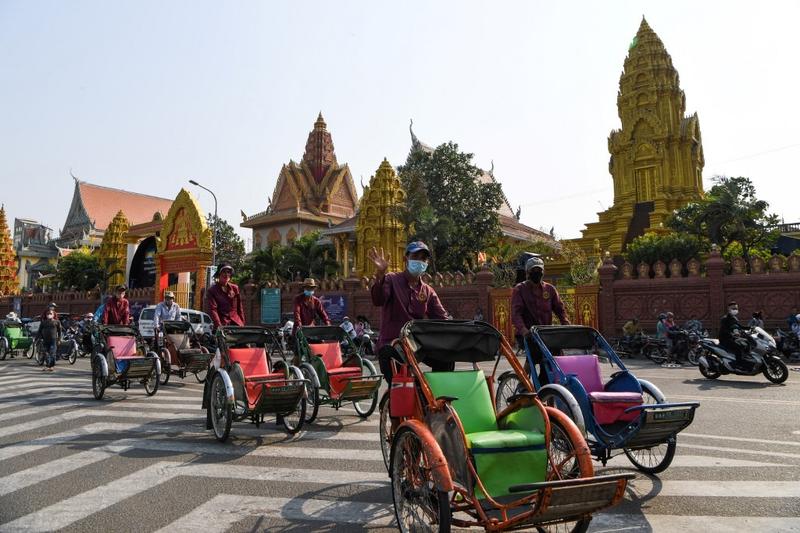 Cambodian cyclo drivers wearing face masks wait outside a pagoda to receive food donations. In Phnom Penh, Cambodia, on March 30, 2020. (TANG CHHIN SOTHY / AFP)
Cambodian cyclo drivers wearing face masks wait outside a pagoda to receive food donations. In Phnom Penh, Cambodia, on March 30, 2020. (TANG CHHIN SOTHY / AFP)
WASHINGTON - The World Bank announced on Monday that it projected growth in developing economies in East Asia and the Pacific (EAP) region to slow to 2.1 percent in the baseline scenario amid the COVID-19 pandemic, from an estimated 5.8 percent in 2019.
Developing economies in EAP, recovering from trade tensions and struggling with COVID-19, now face the prospect of a global financial shock and recession, Aaditya Mattoo, chief economist for East Asia and the Pacific at the World Bank, said in a press call on the multilateral lender's April 2020 economic update for the region.
If the economic situation deteriorates further and the lower-case scenario prevails, then poverty is estimated to increase by about 11 million people, Aaditya Mattoo, chief economist for East Asia and the Pacific at the World Bank, said
ALSO READ: East Asia mainstay in pandemic fight
Noting that making precise growth projections is unusually difficult in a rapidly changing environment, Mattoo told reporters that the new report presents both a baseline and a lower case scenario for growth in 2020, which is 2.1 percent and negative 0.5 percent, respectively.
The economist said the COVID-19 shock will also have a serious impact on poverty. Prior projections estimated that nearly 35 million people would escape poverty across the region this year, but the report estimates that under the baseline growth scenario, nearly 24 million fewer people will escape poverty than would have in the absence of the pandemic.
If the economic situation deteriorates further and the lower-case scenario prevails, then poverty is estimated to increase by about 11 million people, Mattoo said.
READ MORE: East Asia must clear hurdles to sustain growth
He urged countries to take action now, including urgent investments in healthcare capacity and targeted fiscal measures, to mitigate some of the immediate impacts, while stressing the importance of international cooperation.
"Countries in East Asian and the Pacific and elsewhere must fight this disease together, keep trade open and coordinate macroeconomic policy," he said.


